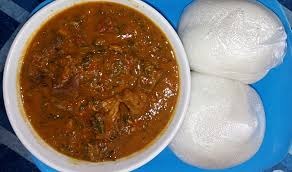Tuwo-Shinkafa – Proudly Nigerian superfood that can gain UN Cultural Status
By Lydia Enyidiya Eke

In the heart of Northern Nigeria, where rice paddies stretch across fertile river valleys, lies one of the country’s most cherished culinary traditions known as Tuwo Shinkafa.
This soft, moldable rice dish, beloved by the Hausa-Fulani people, is more than just food; it is culture, identity, and heritage on a plate.
A dish rooted in history, Tuwo Shinkafa traces its origins to the centuries-old rice farming culture of the North.
Prepared from short-grain or soft rice, it is cooked until tender and then stirred into a smooth, swallow-like consistency. Unlike other Nigerian staples, Tuwo Shinkafa’s preparation is deeply tied to communal dining, festive celebrations, and religious gatherings.
For many northern households, it is not just a meal but a tradition passed down through generations. Served with rich, flavourful soups like Miyan Kuka (baobab leaf soup), Miyan Taushe (pumpkin soup), or Okra soup, the dish highlights the ingenuity of Nigerian cuisine in marrying simple ingredients with complex flavours.
In looking at the nutritional value and health benefit of this delicacy, beyond its cultural symbolism, Tuwo Shinkafa is a powerhouse of nutrition.
Tuwo is an energy provider that is packed with complex carbohydrates, and helps to fuel the body for long hours of work and activity. The food is digestive-friendly, while its smooth, soft texture makes it gentle on the stomach, ideal for children and the elderly.
This starchy food is gluten-free and naturally safe for those with gluten sensitivities or celiac disease. The low fat and moderate protein content makes it a balanced option that promotes satiety without excess calories.
Tuwo Shinkafa’s true strength, however, lies in the company it keeps, with vegetable-rich soups, spices, and proteins that transform it into a complete and wholesome meal.
The uniqueness of Tuwo Shinkafa however sets itself apart from other Nigerian staples like Amala, Fufu, Iyan or Eba by being rice-based. Its smooth texture, neutral taste, and versatility make it a favourite across social classes and communities. It embodies the northern Nigerian identity, carrying with it the values of hospitality, tradition, and unity.
For the Hausa-Fulani, sharing Tuwo is a gesture of warmth, often served to visitors, during weddings, naming ceremonies, and Ramadan feasts. The question of why Tuwo Shinkafa deserves UNESCO Intangible Cultural Heritage Recognition is obvious. Tuwo, as a cultural and traditional food is memory, and memory is heritage. Just as Japan has Washoku (traditional Japanese cuisine) and Mexico has Traditional Mexican Cuisine on the UNESCO Intangible Cultural Heritage (ICH) list, Nigeria can proudly present Tuwo Shinkafa as part of its culinary legacy.
Tuwo Shinkafa is more than food; it is a living heritage that tells the story of northern Nigeria’s traditions, values, and resilience. By inscribing it on the UNESCO Intangible Cultural Heritage list, Nigeria would safeguard a culinary treasure while sharing its cultural richness with the world.
This proposal therefore calls on the Federal Government of Nigeria, the National Council for Arts and Culture, and the Nigerian National Commission for UNESCO to champion Tuwo Shinkafa’s recognition as an Intangible Cultural Heritage of Humanity.
Its candidacy rests on its cultural transmission and the fact that it is passed down generationally, symbolizing knowledge, family, and cultural identity. looking at the community value, it is important to note that Tuwo plays a central role in communal dining, festivals, and religious traditions.
The uniqueness of the preparation and ingredients of Tuwo especially because it is made from locally cultivated rice, connects agriculture to cuisine and tradition. As a rice-based swallow, it broadens the narrative of Nigerian culinary culture beyond yam, cassava, or maize-based foods. As a strong representative of diversity.
By nominating Tuwo Shinkafa for UNESCO’s ICH list, Nigeria would not only preserve its culinary heritage but also project its cultural identity globally, using food diplomacy to showcase the richness of its traditions.
The unique selling point of Tuwo Shinkafa is simple yet premium, versatile yet traditional. Its unique selling points include the fact that Tuwo is a gluten-free Nigerian swallow appealing to global health-conscious markets. It is a cultural tourism driver, attracting food enthusiasts to explore northern Nigeria. It is a heritage food product, capable of being promoted in international festivals, documentaries, and culinary diplomacy.
As a dish worthy of the world’s table, Tuwo Shinkafa is more than sustenance , it is history, identity, and a symbol of resilience. In every scoop lies the story of rice farmers, northern traditions, and a people bound by food and fellowship.
As Nigeria continues to push for the global recognition of its culinary treasures, Tuwo Shinkafa stands tall as a worthy candidate for UNESCO’s Intangible Cultural Heritage list — a northern dish with a global destiny.
• Historical Origins: Tuwo Shinkafa has been consumed for centuries in Northern Nigeria, especially among the Hausa-Fulani people. Its preparation is tied to rice cultivation along the fertile valleys of states such as Sokoto, Kano, Niger, and Kebbi.
• Transmission of Knowledge: The art of making Tuwo Shinkafa is passed down through generations, from mothers to daughters, families to communities, preserving cultural continuity.
• Cultural Functions: Tuwo Shinkafa is central to family meals, festive occasions, weddings, religious celebrations, and communal gatherings, reinforcing social cohesion and unity.
Recommendations and Steps for UNESCO listing
1. National Documentation: It is time to conduct comprehensive research and documentation on Tuwo Shinkafa’s origins, preparation, and cultural significance.
2. Community Engagement: It is time to involve the Hausa-Fulani communities and traditional custodians in recording oral histories and practices.
3. Government-Endorsed Nomination: It is also time to submit an official nomination dossier through Nigeria’s Ministry of Culture and National Commission for UNESCO.
4. Awareness Campaign: This is the time to promote Tuwo Shinkafa nationally and internationally through food festivals, documentaries, and media.
5. Partnerships: This is also the collaborate with academic institutions, NGOs, and cultural bodies to preserve and promote the dish.




